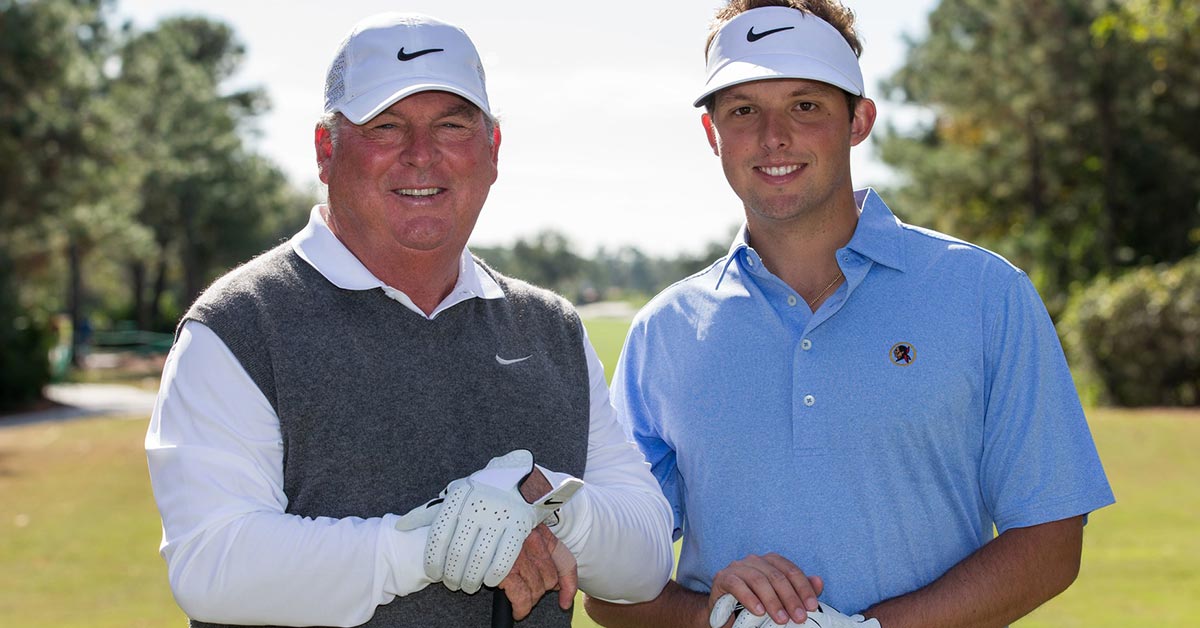Several of us metaphorically were standing around the digital water cooler at work last week, discussing sponsor’s exemptions and other thorny issues related to golf, a game of thorns. What prompted the discussion were Dru Love [pictured] and Tucker Wadkins, scions of World Golf Hall of Famers, who through no fault of their own were in the field at the US PGA Tour’s Charles Schwab Challenge.
Also playing were Tom Purtzer, 67, and Keith Clearwater, 59, both of whom got in on the past-champions category that the tournament offers. Purtzer won in 1991, when it was called the Southwestern Bell Colonial, seven name changes ago. Clearwater won four years earlier, in 1987, when it was known as the Colonial National Invitation, eight name changes ago.
We pause here to stipulate that the sponsor is king. Recall the Golden Rule advanced by the comic strip The Wizard Of Id, that whoever has the gold makes the rules. Sponsors’ multi-million dollar investments entitle them to use the exemptions they’re accorded as they see fit, presumably to boost interest in the tournament. Hence former Dallas Cowboys quarterback Tony Romo recently playing in the AT&T Byron Nelson in Dallas.
That said, every tournament, it seems, has a different set of criteria for assembling their fields. The Charles Schwab Challenge allows past champions, as a collective group, to select two players not otherwise eligible. This year, they chose Love and Wadkins, the latter the son of a past champion.
Davis Love III’s son shot 78-80 and missed the cut by 16 strokes. Lanny Wadkins’ son shot 76-78 and missed the cut by 12. Dru Love, incidentally, has now played 18 PGA Tour events, all save for his 2017 US Open appearance on sponsor’s exemptions, and has made only three cuts, his best finish a T-54 in the RSM Classic last November near his home in Sea Island, Georgia.

The tournament at Colonial is an invitational, which means it already has a smaller field than most tour stops, 120 players, in theory. But when past champions who won the event before 2000 decide to play, as Purtzer and Clearwater did, they don’t count against the 120, they add to it. Purtzer then took 80 strokes to complete the first 17 holes of the first round and withdrew. Clearwater, who last made a PGA Tour cut 18 years ago, missed the cut by three.
A tweet, meanwhile, created a minor kerfuffle when it noted Purtzer’s WD and the fact that first alternate Jim Knous – a PGA Tour rookie who is 131st on the FedEx Cup points list and in need of starts to get into the top 125 – was unable to get in.
While Jim Knous waited at course all day and failed to get in, 67 yr old Tom Purtzer WD after 17 holes at +14. Knous sits at 131st in FedEx standings, and needs every start he can get https://t.co/nmid1kAM8X
— Monday Q Info (@acaseofthegolf1) May 23, 2019
“Complete BS move by Purtzer,” former PGA Tour player Parker McLachlin tweeted in response. “Either sign for the 85 or don’t show up in the first place.”
Colt Knost helpfully clarified the situation, that even had Purtzer withdrawn prior to starting his round, Knous would not have gotten in. He needed someone from the original 120 to withdraw.
It is not our intention to pick on the Charles Schwab Challenge or to vilify any of the four players, all of whom were playing under the rules in place. In the matter of Love and Wadkins, each is attempting to make his own way, and the PGA Tour would be enriched to have a third-generation Love and a second-generation Wadkins on its full-time roster. Having Hall of Fame fathers has its advantages in assisting them in their quests.
The point here is that perhaps there are more judicious ways of filling fields. Here’s one idea: instead of a nod to the past, as the Charles Schwab Challenge has done with its past-champions exemptions, how about a nod to the future? Maybe tournaments should be obligated to extend an invitation to a top amateur from their area.
Such invitations have paid off in the past. Dallas native Jordan Spieth, the reigning US Junior Amateur champion at the time, was 16 when he was given a sponsor’s exemption into the 2010 AT&T Byron Nelson. He tied for 16th, with huge crowds following him on Sunday.
Arizona State star Phil Mickelson, still an amateur, was given an exemption into the Northern Telecom Open in Tucson in 1991 and won the tournament. More recently, Braden Thornberry, an NCAA champion and Tennessee native, was given an exemption into Memphis’ FedEx St Jude Classic in 2017 and tied for fourth.
But it requires vision. Xander Schauffele, a standout at San Diego State who was born at Scripps Memorial Hospital in La Jolla, two miles from Torrey Pines Golf Course, politely requested an exemption into the Farmers Insurance Open three years running and was denied each time.
He’s now the ninth-ranked player in the world.
An opportunity missed.



